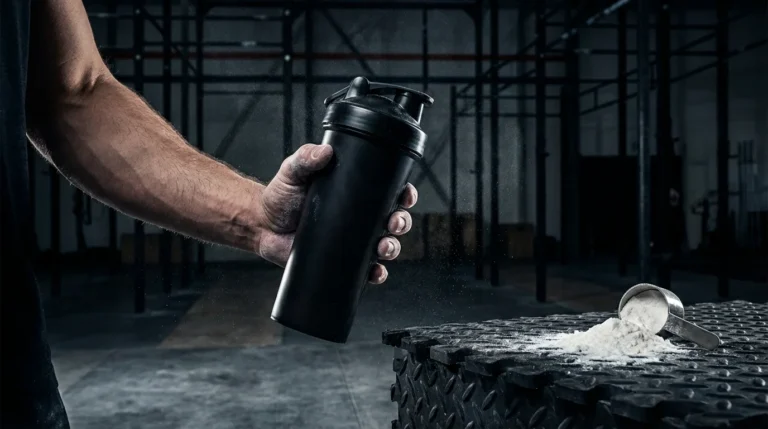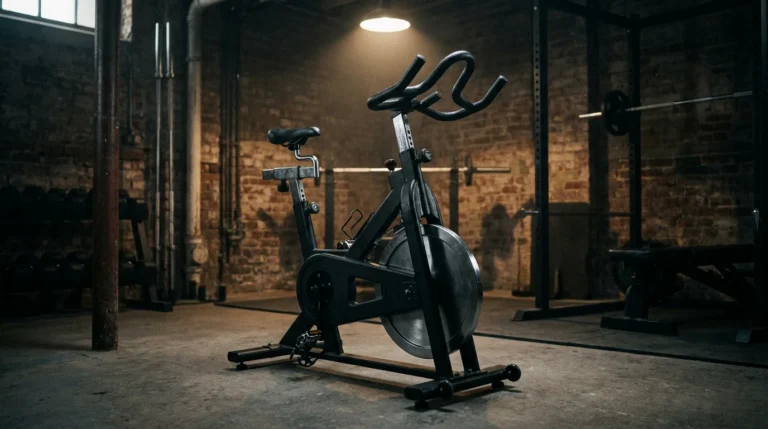Understanding how heart rate monitors can help you improve your fitness is important for everyone.
These tools can guide your workouts, ensuring you’re training at the right intensity to reach your goals.
In this article, we’ll break down everything you need to know about heart rate monitors in 2024, from the basics to advanced features, helping you unlock your fitness potential.
Key Takeaways about Heart Rate Monitors
- Heart rate monitors help track your exercise intensity.
- Choosing the right type, like chest straps or wrist monitors, is key to accuracy.
- Using heart rate zones can improve workout effectiveness.
- Modern monitors offer advanced features like smartwatch integration.
- Avoid common mistakes, like ignoring heart rate data, to maximize your training.
Heart Rate Monitors: Benefits & Features
Understanding Heart Rate Monitors

What Are Heart Rate Monitors?
Heart rate monitors are nifty gadgets that help us keep track of our heart rate during workouts.
They come in different forms, like chest straps and wrist-based devices.
These tools are essential for anyone looking to optimize their fitness journey.
They provide real-time data, allowing us to see how hard our hearts are working while we exercise.
How Do Heart Rate Monitors Work?
These monitors work by detecting our heartbeats and sending that information to a display device, like a watch or smartphone.
They use sensors to measure the electrical signals produced by our hearts.
Here’s a quick breakdown of how they function:
- Detection: Sensors pick up heartbeats.
- Transmission: Data is sent to a connected device.
- Display: We see our heart rate in real-time.
Benefits of Using Heart Rate Monitors
Using heart rate monitors can really enhance our workouts. Here are some benefits:
- Track Intensity: Helps us know if we’re in the right heart rate zone for our goals.
- Prevent Overtraining: Keeps us from pushing too hard and risking injury.
- Measure Progress: We can see improvements in our fitness levels over time.
By understanding our heart rates, we can tailor our workouts to fit our personal fitness goals better.
In summary, heart rate monitors are more than just cool gadgets; they’re essential tools for anyone serious about their fitness. Whether we’re just starting out or are seasoned athletes, these devices can help us unlock our full potential!
Choosing the Right Heart Rate Monitor for You
Chest Strap vs. Wrist-Based Monitors
When it comes to picking a heart rate monitor, we often find ourselves torn between chest straps and wrist-based options.
Chest straps are generally more accurate because they sit snugly against our chest and measure our heart rate in real-time.
On the other hand, wrist-based monitors are super convenient and easy to wear daily, but they might not be as precise. Here’s a quick comparison:
| Feature | Chest Strap | Wrist-Based Monitor |
|---|---|---|
| Accuracy | High | Moderate |
| Comfort | Can be uncomfortable | Comfortable for daily wear |
| Battery Life | Long-lasting | Varies by model |
Top Brands to Consider
When we’re on the hunt for the best heart rate monitors 2024, there are a few brands that stand out:
- Garmin: Known for their high-quality GPS watches with heart rate monitoring.
- Polar: The Polar H10 is a chest strap heart rate monitor that earns our top spot because it’s user-friendly and stays in place.
- Apple: The Apple Watch offers comprehensive health and fitness tracking.
Budget-Friendly Options
We all love a good deal, right?
Here are some budget-friendly heart rate monitors that won’t break the bank:
- Xiaomi Mi Band: Affordable and offers basic heart rate tracking.
- Fitbit Inspire 2: A solid choice with good features at a reasonable price.
- Wahoo TICKR: A reliable chest strap that’s easy on the wallet.
Choosing the right heart rate monitor is all about finding what fits our needs and lifestyle best. Whether we prioritize accuracy, comfort, or price, there’s something out there for everyone!
Integrating Heart Rate Monitors into Your Fitness Routine
Setting Up Your Heart Rate Monitor
Getting started with a heart rate monitor is super easy! Here’s how we can set it up:
- Choose the right monitor: Decide between a chest strap or a wrist-based monitor based on your comfort and accuracy needs.
- Follow the instructions: Each device comes with its own setup guide, so let’s make sure we read that carefully.
- Sync with your phone or watch: Most monitors connect to apps that help track our data. Let’s get that synced up!
Using Heart Rate Zones for Training
Understanding heart rate zones is key to maximizing our workouts. Here’s a quick breakdown:
- Zone 1 (50-60% of MHR): Light activity, great for warm-ups.
- Zone 2 (60-70% of MHR): Moderate activity, perfect for fat burning.
- Zone 3 (70-80% of MHR): Aerobic zone, ideal for building endurance.
- Zone 4 (80-90% of MHR): Anaerobic zone, great for high-intensity training.
- Zone 5 (90-100% of MHR): Maximum effort, used for short bursts like sprints.
Using these zones helps us train smarter, not harder!
Tracking Progress with Heart Rate Data
Keeping track of our heart rate data can show us how we’re improving. Here’s what we can do:
- Log workouts: Use an app to record our heart rate during different exercises.
- Review trends: Look for patterns in our heart rate over time to see improvements.
- Adjust training: If we notice we’re not hitting our target zones, it might be time to tweak our workouts.
Remember, heart rate monitors are tools to help us, but listening to our bodies is just as important! Let’s not forget to hydrate and rest when needed.
By integrating heart rate monitors into our fitness routine, we can unlock our full potential and make every workout count!
Advanced Features of Modern Heart Rate Monitors
Smartwatch Integration
These days, many heart rate monitors can sync with smartwatches.
This means we can check our heart rate right on our wrist without needing extra devices.
It’s super convenient!
Plus, we can get notifications and track other fitness metrics all in one place.
Wearable Technology Innovations
Wearable tech is getting cooler every year! From heart rate monitoring earbuds to smart clothing, we have more options than ever.
These gadgets can help us stay on top of our fitness game without being bulky or uncomfortable. Imagine working out while your shirt tracks your heart rate!
Data Analysis and Insights
Modern heart rate monitors don’t just show numbers; they analyze our data too!
We can see trends over time, like how our heart rate changes during workouts. This helps us understand our fitness levels better and adjust our training plans accordingly.
Here’s a quick look at what we can track:
| Feature | Description |
|---|---|
| Average Heart Rate | Our average heart rate during a workout |
| Max Heart Rate | The highest heart rate reached |
| Recovery Rate | How quickly our heart rate returns to normal |
By using these advanced features, we can really maximize our workouts and reach our fitness goals faster!
In conclusion, the latest heart rate monitors offer us a lot more than just basic tracking. With smart integrations, innovative wearables, and insightful data analysis, we can truly unlock our fitness potential!
Common Mistakes and How to Avoid Them

When it comes to using heart rate monitors, we all want to get the most out of our workouts.
However, there are some common mistakes we can easily fall into. Let’s break them down and see how we can avoid them!
Ignoring Heart Rate Zones
One of the biggest blunders we can make is not paying attention to our heart rate zones. These zones are essential for effective training.
Here’s how to keep them in mind:
- Know your zones: Familiarize yourself with the different heart rate zones and what they mean for your training.
- Adjust your workouts: Make sure to tailor your workouts to stay within the appropriate zones for your goals.
- Don’t get too strict: Remember, heart rate zones are guidelines. We shouldn’t get caught up in strict adherence to them. Flexibility is key!
Over-Reliance on Technology
While heart rate monitors are super helpful, we can sometimes rely on them too much. Here’s how to strike a balance:
- Listen to your body: If you feel tired or off, don’t just rely on the monitor. Take a break or adjust your workout.
- Use it as a tool, not a crutch: Heart rate data is great, but it shouldn’t dictate every move we make.
- Mix it up: Incorporate other training methods and listen to your instincts.
Not Adjusting for Fitness Level Changes
As we progress in our fitness journey, our heart rate zones can change. Here’s how to keep up:
- Reassess regularly: Every few months, check in on your heart rate zones and adjust them based on your current fitness level.
- Stay informed: Keep learning about how your body responds to different workouts and adjust accordingly.
- Don’t be afraid to change: If something isn’t working, it’s okay to switch things up!
Remember, the importance of accurate heart rate data cannot be overstated. Inaccurate data can lead to training in the wrong zones, potentially reducing the effectiveness of our workouts or even leading to overtraining.
By avoiding these common mistakes, we can make the most of our heart rate monitors and truly unlock our fitness potential!
Maximizing Your Workouts with Heart Rate Monitors
When it comes to getting the most out of our workouts, heart rate monitors are our best friends.
They help us understand how hard we’re really working and ensure we’re hitting those sweet spots in our training.
Here’s how we can maximize our workouts using these nifty devices.
Tailoring Workouts to Heart Rate Zones
To really get the benefits from our training, we need to know about heart rate zones. Here’s a quick breakdown:
| Heart Rate Zone | Percentage of MHR | Focus |
|---|---|---|
| Zone 1 | 50-60% | Recovery |
| Zone 2 | 60-70% | Fat burning |
| Zone 3 | 70-80% | Endurance |
| Zone 4 | 80-90% | Performance |
| Zone 5 | 90-100% | Max effort |
By training in the right zones, we can improve our fitness levels and avoid burnout.
Preventing Overtraining
It’s super easy to push ourselves too hard, especially when we’re excited about our progress.
Here are some tips to avoid overtraining:
- Listen to your body: If we feel tired, it’s okay to take a break.
- Mix it up: Incorporate different types of workouts to keep things fresh.
- Use heart rate data: Keep an eye on our heart rate to ensure we’re not constantly in the high zones.
Enhancing Endurance and Stamina
To build our endurance, we should focus on longer workouts in the lower zones. Here’s how:
- Start slow: Begin with steady-state cardio in Zones 2 and 3.
- Gradually increase duration: Add a few minutes each week to our workouts.
- Incorporate intervals: Mix in short bursts of higher intensity to boost stamina.
Remember, the key to success is consistency. By using our heart rate monitors wisely, we can track our progress and make adjustments as needed.
In conclusion, heart rate monitors are essential tools for maximizing our workouts. By understanding heart rate zones, preventing overtraining, and enhancing our endurance, we can unlock our full fitness potential!
The Future of Heart Rate Monitoring
As we look ahead, the world of heart rate monitoring is set to change in some exciting ways.
Emerging technologies are paving the way for smarter, more efficient devices that can help us track our fitness like never before.
Emerging Technologies
We’re seeing a surge in innovations that make heart rate monitoring more accessible and accurate. Some of the coolest advancements include:
- Wearable tech that seamlessly integrates with our daily lives.
- Smart clothing that can monitor heart rates without any extra devices.
- Advanced sensors that provide real-time data for better training decisions.
Trends in Fitness Tracking
The fitness tracking landscape is evolving, and here are some trends we can expect:
- Increased use of AI to analyze heart rate data and provide personalized insights.
- More budget-friendly options that don’t skimp on quality.
- Integration with other health metrics for a holistic view of our fitness.
The Role of AI in Heart Rate Monitoring
AI is becoming a game-changer in how we understand our heart rates. It can help us:
- Predict our performance based on past data.
- Offer tailored workout suggestions.
- Identify patterns that might indicate overtraining or fatigue.
As we embrace these advancements, we can unlock our full fitness potential and make smarter choices in our training routines.
In summary, the future of heart rate monitoring looks bright, with exciting innovations on the horizon that will help us all stay fit and healthy!
Wrapping It Up: Your Fitness Journey with Heart Rate Monitors
Heart rate monitors are not just fancy gadgets; they’re your best buddies in the gym.
They help you understand how hard your heart is working, which means you can train smarter, not just harder.
Whether you want to lose weight, get fit, or just feel better, these tools can guide you every step of the way.
Remember, it’s all about finding the right balance and listening to your body. So, grab a heart rate monitor, get moving, and unlock your true fitness potential!








